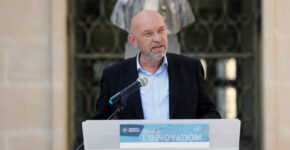Boards and committees
Board of Directors
Composed of 36 members—24 of whom are directly elected by the university community using a proportional representation list system—the board of directors determines the institution's policy.
In this sense, he:
- decides on the main points of the five-year contract,
- votes on the budget and approves the accounts for all components of the University (faculties, institutes, schools),
- also decides on the distribution of jobs,
- determines the methods for assessing knowledge for the various diplomas awarded,
- validates the statutes of the components and their internal structures,
- exercises disciplinary authority over Professors users,
- statue as a last resort on proposals submitted by the Research Committee Research the Education and University Life Committee in their respective fields.
Board calendar – Board composition
Board deliberations: Public access – UM personal access
Academic Council
Composed of 80 elected members divided into two committees of 40 members each (the research committee and the education and university life committee), the academic council ensures consistency and coordination between education and research policies.
The Academic Council becomes the decision-making body in certain areas. The same applies to the Research Training, and University Life Committee.
In plenary session, the Academic Council:
- is consulted or may express opinions on the direction of policies relating to training, research, the dissemination of scientific, technical, and industrial culture, and scientific and technical documentation; on the qualifications required for vacant or requested positionsProfessor researchers; on the accreditation application referred to in Article L. 613-1; and on the establishment contract;
- proposes to the Board of Directors a multi-year master plan for disability policy, covering all areas related to disability;
- is consulted on all measures aimed at guaranteeing the exercise of academic freedom and the trade union and political freedoms of students.
In 2016, disciplinary authority over Professors, teachers, and users will be exercised in the first instance by the Academic Council, constituted as a disciplinary section. (L. 712-6-2).
In restricted session, the Academic Council is responsible for:
- reviewing individual matters relating to the recruitment, assignment, and career development of Professors.
- deliberate on the integration of civil servants from other bodies into the body of Professors on the recruitment or renewal of temporary teaching and research assistants.
In this context, it is composed of an equal number of men and women and an equal number of representatives of university professors and other Professors.
CAC calendar – Composition of the CAC
CAC deliberations: Public access – UM personal access
Commission on Education and University Life
The Academic Council's Commission for Education and University Life (CFVU) adopts:
- the distribution of training resources as allocated and defined by the Board of Directors;
- the rules relating to examinations;
- the rules for evaluating teaching;
- measures aimed at ensuring the success of as many students as possible;
- measures to enable student guidance and the validation of prior learning, to facilitate their entry into working life, and to promote cultural, sporting, social, or community activities;
- measures to improve living and working conditions, including measures relating to support activities, university and school facilities, medical and social services, libraries and documentation centers, and access to digital resources;
- measures aimed at promoting and developing interactions between science and society, initiated and led by students or Professors
- the measures necessary to welcome and ensure the success of students with disabilities or disabling health conditions, in accordance with the obligations incumbent upon higher education institutions.
It is consulted on the training programs of the components.
CFVU calendar – Composition of the CFVU
CFVU deliberations: Public access – UM personal access
Research Committee
Their role consists of:
- allocate the research budget allocated by the board of directors, subject to the strategic framework for its distribution (also defined by the board of directors);
- set the rules for the operation of laboratories;
It is consulted on agreements with research organizations.
It adopts measures to enable students to develop activities that promote scientific, technical, and industrial culture.
CR deliberations: Public access – UM personal access
Social Administration Committee (CSA)
Joint Establishment Committee (JEC)
The Joint Establishment Committee is consulted on individual decisions concerning BIATS staff members.
It prepares the work of the joint administrative committees relevant to these staff members.
Specialized training in Health, Safety, and Working Conditions (F3SCT)
Specialized training in health, safety, and working conditions (F3SCT) contributes to protecting the health and safety of employees and improving their working conditions.
The Specialized Training in Health, Safety, and Working Conditions (F3SCT) aims to contribute to improving working conditions, employee safety at work, and physical and mental health protection. As part of their duties, F3SCT members have the right to access premises within their area of responsibility.
The F3SCT may also be consulted on any matter falling within its jurisdiction.
Research Ethics Board (REB)
The Research Ethics Committee of the University of Montpellier, created on February 8, 2022, is an independent and impartial forum for reflection, open to several disciplines. It offers Professors opportunity to submit their research projects and protocols involving human subjects, particularly those concerning issues related to personal data and privacy, in order to obtain an ethical opinion.
Since transforming the university into an experimental public institution and establishing this committee, Philippe Augé, president of the University of Montpellier, has demonstrated the UM's commitment to honest, ethical, and responsible research.
The creation of this Research Ethics Committee reinforces the measures put in place by the University of Montpellier to promote awareness of the importance of ethical and professional principles in response to questions raised by scientific progress and its contemporary societal repercussions, regardless of the field of research. The Research Ethics Committee can now be consulted by project leaders for:
- an ethical opinion on the development of new protocols;
- an ethical opinion in support of funding applications;
- an ethical opinion in support of responses to internal calls for projects, but also and above all to regional, national, and international calls for projects;
- an ethical opinion at the request of scientific journals.
However, this committee does not deal with interventional (or biomedical) research, which is governed by the Jardé Act and its implementing decree, and therefore by specific authorities.
All practical information is published on the UM intranet site. The secretariat for this body is provided by the Directorate for Research and Doctoral Studies (DRED).



